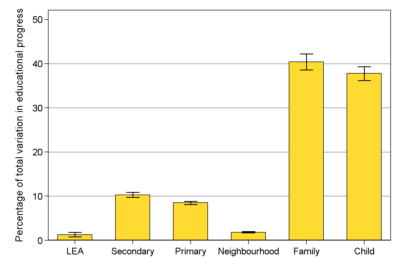Children grow up in complex social environments. The influences on a child’s development are many, and many layered. The school they go to, the family around them, and the neighbourhood they grow up in are often highlighted as particularly important for children’s educational achievements. But, which is the most important?
Families account for 40% of the overall variation between children in their academic progress during secondary schooling;
The wider shared environments of primary school (9%), secondary school (10%), neighbourhood (2%) and LEA (1%) account for 22%;
Children themselves account for the remaining 38%.
From a school effectiveness point of view it is interesting that the family effect is just as important as the child effect. However, this does not necessarily imply that interventions to improve child academic outcomes are best implemented at the family level. While primary and secondary schools appear less important than families, they still make reasonably substantial contributions; and it is at these levels that many educational policies are likely to be most effective. It is easier for governments to intervene in the running of schools than to change parenting practices within families.
Our knowledge of the impact of schools, neighbourhoods and families comes from studies that look at each of these influences separately and therefore little is known about their relative importance. For example, school effectiveness studies attempt to measure the importance of schools on children’s academic progress, but nearly always ignore the role of family. Family research using siblings, on the other hand, attempts to quantify the importance of genetic and environmental family influences, but nearly always ignores the role of the wider shared environment of schools and neighbourhoods. Knowledge of the relative effects of schools, neighbourhoods and families is needed to help inform decisions about the allocation of government resources to programmes and policies that will support children’s learning.
We follow half a million English school children through secondary schooling. We use cross-classified multilevel statistical models to estimate the impact of the different influences of children’s complex social environments on their academic progress.
Our final model decomposes the variation in children’s progress into effects attributable to six influences: Local Education Authorities (LEAs), secondary schools, neighbourhoods, primary schools, families and children. This is an improvement on previous school effectiveness studies because it differentiates, for the first time, between the effects of the family and of the pupil; and it is an improvement on previous family research because it estimates the influence of the family-shared environment separately from those of the wider shared environments of schools and areas. Thus, we unite school effectiveness studies and family research under a single framework and therefore disentangle, the various influences on children’s progress.

The importance of different influences on educational progress, with 95% credible intervals
References for practitioners, journalists, and policy-makers
Leckie, G., Pillinger, R., Jenkins, J. and Rasbash, J. (2010). School, family, neighbourhood: which is most important to a child's education? MethodsNews: Newsletter from the ESRC National Centre for Research, Summer, 4.
Leckie, G., Pillinger, R., Jenkins, J. and Rasbash, J. (2010). School, family, neighbourhood: which is most important to a child's education? Significance, 7, 67-72.
References for academics
Rasbash J., Leckie G., Pillinger R. and Jenkins J. (2010) Children’s educational progress: partitioning family, school and area effects. Journal of the Royal Statistical Society, Series A, 173, 657-682.
Dr George Leckie, Rebecca Pillinger, Professor Jennifer Jenkins and Professor Jon Rasbash
g.leckie@bristol.ac.uk
Assessment and Evaluation; Multilevel Modelling; Quantitative Methods
